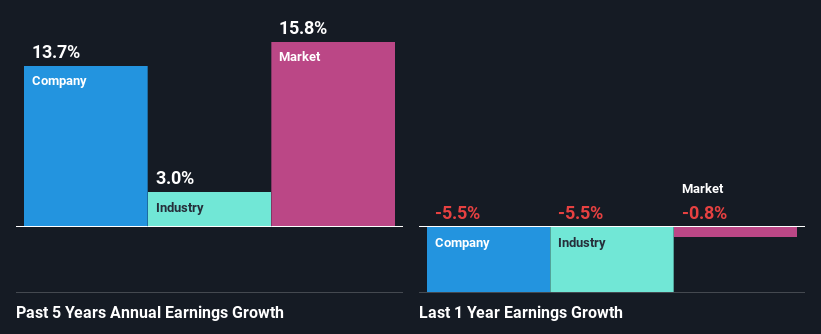CSR’s (ASX:CSR) stock is up by 3.0% over the past month. Given its impressive performance, we decided to study the company’s key financial indicators as a company’s long-term fundamentals usually dictate market outcomes. Particularly, we will be paying attention to CSR’s ROE today.
Return on equity or ROE is an important factor to be considered by a shareholder because it tells them how effectively their capital is being reinvested. Simply put, it is used to assess the profitability of a company in relation to its equity capital.
Check out our latest analysis for CSR
How Do You Calculate Return On Equity?
ROE can be calculated by using the formula:
Return on Equity = Net Profit (from continuing operations) ÷ Shareholders’ Equity
So, based on the above formula, the ROE for CSR is:
17% = AU$199m ÷ AU$1.2b (Based on the trailing twelve months to September 2023).
The ‘return’ refers to a company’s earnings over the last year. So, this means that for every A$1 of its shareholder’s investments, the company generates a profit of A$0.17.
What Is The Relationship Between ROE And Earnings Growth?
Thus far, we have learned that ROE measures how efficiently a company is generating its profits. Based on how much of its profits the company chooses to reinvest or “retain”, we are then able to evaluate a company’s future ability to generate profits. Generally speaking, other things being equal, firms with a high return on equity and profit retention, have a higher growth rate than firms that don’t share these attributes.
CSR’s Earnings Growth And 17% ROE
To begin with, CSR seems to have a respectable ROE. Further, the company’s ROE compares quite favorably to the industry average of 9.6%. Probably as a result of this, CSR was able to see a decent growth of 14% over the last five years.
As a next step, we compared CSR’s net income growth with the industry, and pleasingly, we found that the growth seen by the company is higher than the average industry growth of 3.0%.
Earnings growth is a huge factor in stock valuation. What investors need to determine next is if the expected earnings growth, or the lack of it, is already built into the share price. This then helps them determine if the stock is placed for a bright or bleak future. What is CSR worth today? The intrinsic value infographic in our free research report helps visualize whether CSR is currently mispriced by the market.
Is CSR Using Its Retained Earnings Effectively?
The high three-year median payout ratio of 65% (or a retention ratio of 35%) for CSR suggests that the company’s growth wasn’t really hampered despite it returning most of its income to its shareholders.
Besides, CSR has been paying dividends for at least ten years or more. This shows that the company is committed to sharing profits with its shareholders. Our latest analyst data shows that the future payout ratio of the company over the next three years is expected to be approximately 74%. Therefore, the company’s future ROE is also not expected to change by much with analysts predicting an ROE of 16%.
Summary
In total, we are pretty happy with CSR’s performance. In particular, its high ROE is quite noteworthy and also the probable explanation behind its considerable earnings growth. Yet, the company is retaining a small portion of its profits. Which means that the company has been able to grow its earnings in spite of it, so that’s not too bad. That being so, a study of the latest analyst forecasts show that the company is expected to see a slowdown in its future earnings growth. Are these analysts expectations based on the broad expectations for the industry, or on the company’s fundamentals? Click here to be taken to our analyst’s forecasts page for the company.
Have feedback on this article? Concerned about the content? Get in touch with us directly. Alternatively, email editorial-team (at) simplywallst.com.
This article by Simply Wall St is general in nature. We provide commentary based on historical data and analyst forecasts only using an unbiased methodology and our articles are not intended to be financial advice. It does not constitute a recommendation to buy or sell any stock, and does not take account of your objectives, or your financial situation. We aim to bring you long-term focused analysis driven by fundamental data. Note that our analysis may not factor in the latest price-sensitive company announcements or qualitative material. Simply Wall St has no position in any stocks mentioned.

















